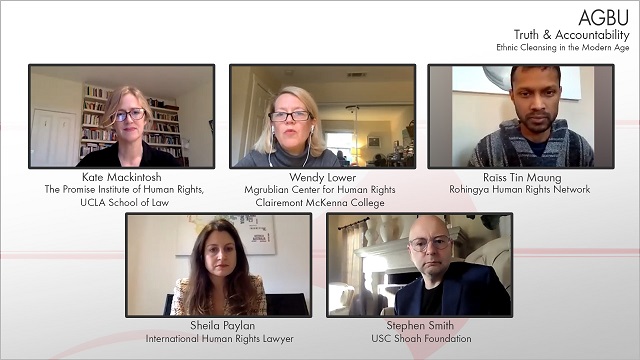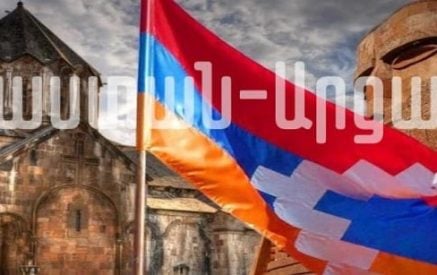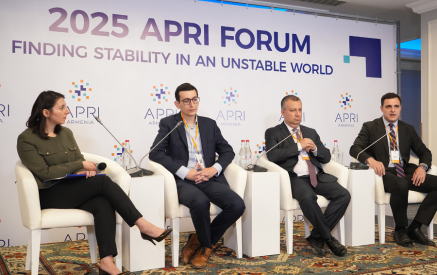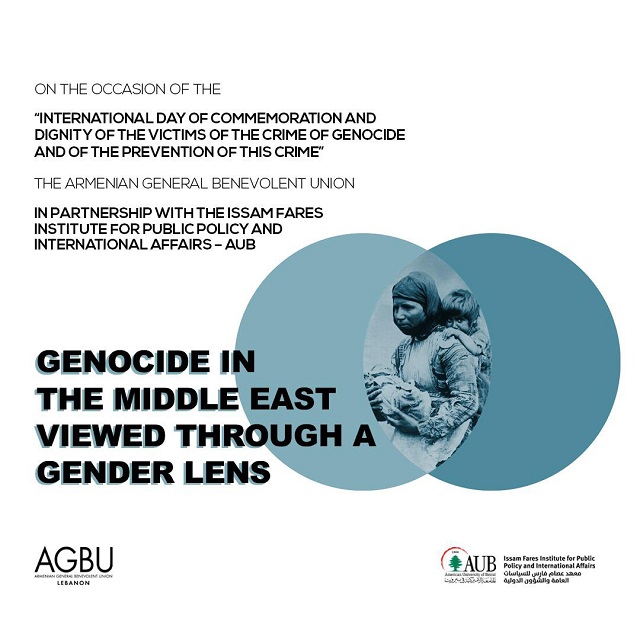For immediate release
Given its century-old history of advocating for the human rights and dignity of the Armenian people, the Armenian General Benevolent Union (AGBU) has long recognized the importance of supporting all victims of ethnic cleansing, genocide and other crimes against humanity around the world. That is why it continues to observe December 9th—the United Nations International Day of Commemoration and Dignity of the Victims of the Crime of Genocide and the Prevention of this Crime–with inclusive discussions of an international scope, each year focusing on a different theme related to this vast, multi-dimensional subject.
This year, two virtual events were organized, one by AGBU Lebanon in conjunction with the Issam Fares Institute for Public Policy and International Affairs at the American University of Beirut, and the other by the AGBU Central Office in New York in partnership with the Promise Institute for Human Rights, operating out of California.
Lebanon
Read also
Genocide in the Middle East Viewed from a Gender Lens
AGBU Lebanon has embraced AGBU’s mission to expand its outreach and education to those outside of the Armenian community. By partnering with esteemed institutions each year, it not only offers a broader dialogue in which to tell the Armenian story to new audiences, but also to encourage understanding and collaborative exchange for a better future,” explained Mireille Kanamirian, AGBU Lebanon District Committee Member and lead of lead of human rights and cultural partnership initiatives.
Taking its cue from the United Nations’ chosen theme of how women bear the brunt of oppressive and genocidal regimes, this long overdue topic established the framework for the conference on December 9th, coordinated from Beirut. The three-hour event, divided into two sessions, featured panelists from diverse disciplines who could speak authoritatively about human rights crimes against women and children.
In their opening remarks, Berge Setrakian, the president of AGBU, and Dr. Joseph Bahout, the director of Issam Fares Institute, framed the discussion by contextualizing the mistreatment of women in the greater scheme of genocide studies.
The first session was moderated by International Criminal Lawyer and Presidential Professor of Law emeritus Chibli Mallat of the University of Utah. The panel featured Dr. Darina Saliba Abi Chedid, the director of the International Center for Human Sciences; Dr. Carol Mann, the director of Women in War; and the noted peace-building expert Maya Jizzini.
The second session was moderated by regional analyst Yeghia Tashjian with a panel including Abid Shamdeen, the executive director of Nadia’s Initiative; Bourshra Ali, the president of the Jin Women’s Foundation; Dr.Samah Saleh, an assistant professor at An-Najah National University; Michel Mallo, the secretary general of the Syriac Union: and Dr. Roy Knocke, the deputy director of Lepsius Haus Potsdam.
Throughout the day, the panelists made the case that the murder of and abusive acts against women are an intentional tactics used to eradicate the present and the future. Examples abounded: how perpetrators justify ethnic cleansing of women in marginalized communities throughout the Middle East; how the Islamic State justified attacks on Yazidi women by “othering” their existence and claiming they were not people of the book; and the experience of Kurdish women who were victims of deliberate attempts to Turkify them and even how prominent women in Kurdish society were assassinated. “All genocides are gendered,” is how Dr. Mann summed up the key points presented.
The discussion then turned to the role women play after crimes against humanity are committed, citing the crucial role of Palestinian women in revitalizing their community after the 1948 Palestinian exodus, known as the Nakba and fighting for the Palestinian return through protest, community-building, and clandestine organizing. Assyrian women were also described as change-makers, along with their pivotal and impressive rise to leadership positions. Such cases debunk the myth that women are apolitical caretakers and highlight the crucial part they actually play in seeking justice after mass atrocities have occurred. Women also are proponents of peace, be it personal peace, familial peace, or national, regional, and international peace, posited Jizzini.
The virtual conference concluded with a lively Q&A session with attendees from around the world.
United States
Truth and Accountability: Ethnic Cleansing in the Modern Age
On December 10th, an open conversation hosted by AGBU and the Promise Institute for Human Rights featured international war crimes barrister Geoffrey Robertson QC; esteemed human rights lawyer Sheila Paylan; Raees Tin Maung of the Rohingya Human Rights Network of Canada; Stephen Smith, the executive director of the USC Shoah Foundation, Kate Mackintosh, the executive director of the Promise Institute of Human Rights at the UCLA School of Law; and moderator Wendy Lower, director of Mgrublian Center for Human Rights at Claremont McKenna College. The thrust of the discussion centered on raising awareness and holding perpetrators accountable for ongoing atrocities.
In his opening remarks, Robertson asserted: “The denial of genocide is a way of perpetrating and perpetuating genocide, adding that “the wickedness of the Ottoman Empire in 1915 was seen over the sky and over the Artsakh mountains in 2020.” Emphasizing the necessity of finding ways to prevent genocide, ethnic cleansing, and war crimes, he emphatically declared, “We have international laws to prevent genocide, but we don’t have the will to enforce those laws.”
Picking up on the recent war in Nagorno-Karabakh, Lower stated: “We feel the echoes of history in the Nagorno-Karabakh region. One hundred years on, the echoes of that history are with us at this very moment.” She added that the definition and weight behind the legal term Genocide have often prevented economic and legal action, a conclusion shared by all the panelists.
Mackintosh remarked, “If we think about some of the mass atrocities that have taken place last century, they have not met the legal definition of genocide. But no one would deny that those are terrible, terrible things that we want to prevent.”
Focusing on taking action rather than letting politics interfere with the actionable change, Smith said, “What’s important is establishing: what’s the intent; what’s the endgame; and what are we going to do to mitigate that and highlight that. The definitional issue gets us a little entrapped because it politicizes it.”
All speakers agreed that the collection of eyewitness reports is an essential tool that victims and activists can use to document cases of injustice. Smith, a specialist in the collection of testimonies of victims of mass atrocities, explained. “For those who are experiencing unfolding mass violence, what they need to know is that people are hearing them, that they do not feel abandoned. Make it clear that we really do care for each other. That’s half of the battle.”
Paylan posited that more often than not, seeking legal justice is a complex process. “When it comes to lending humanitarian aid, it tends to be easy to garner support for it,” she noted. “When it comes to seeking accountability for crimes, it’s a much more difficult process.” She also pointed out that in the case of Artsakh, social media proved key in collecting evidence. “All the hatred that is spewed by the highest-ranking officials of Azerbaijan on Twitter and Facebook – this is evidence. If it’s not collected and preserved right away, it will disappear.” She advocated for the centralization of this documentation as a priority for open-source investigators.
The conference concluded with panelists suggesting optimum ways to prevent or prosecute human rights crimes, such as holding inter-ethnic and inter-religious discussions. Maung made an astute observation: “The people who are doing the most effective and noble work are people in inter-ethnic and inter-religion bridging. It is crucial that we collaborate and show solidarity. Yesterday it was them, today it was us, and tomorrow it could be someone else.”
Genocide in the Middle East Viewed from a Gender Lens
facebook.com/AgbuLebanon/videos/3646939152010908
Truth and Accountability: Ethnic Cleansing in the Modern Age
The Armenian General Benevolent Union (AGBU) is the world’s largest non-profit organization devoted to upholding the Armenian heritage through educational, cultural and humanitarian programs. Each year, AGBU is committed to making a difference in the lives of 500,000 people across Armenia, Artsakh and the Armenian diaspora. Since 1906, AGBU has remained true to one overarching goal: to create a foundation for the prosperity of all Armenians. To learn more visit www.agbu.org.
Armenian General Benevolent Union Press Office
























































